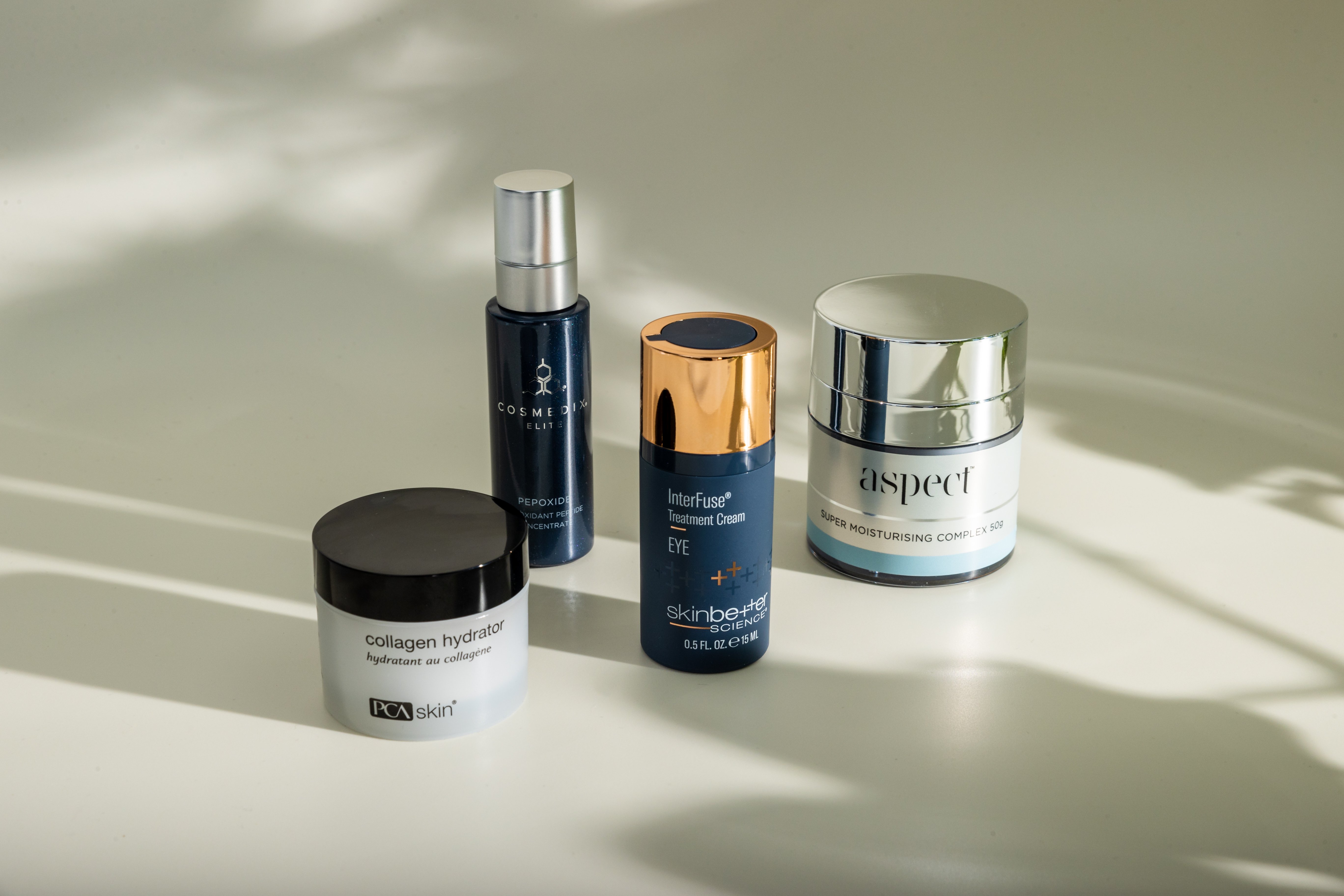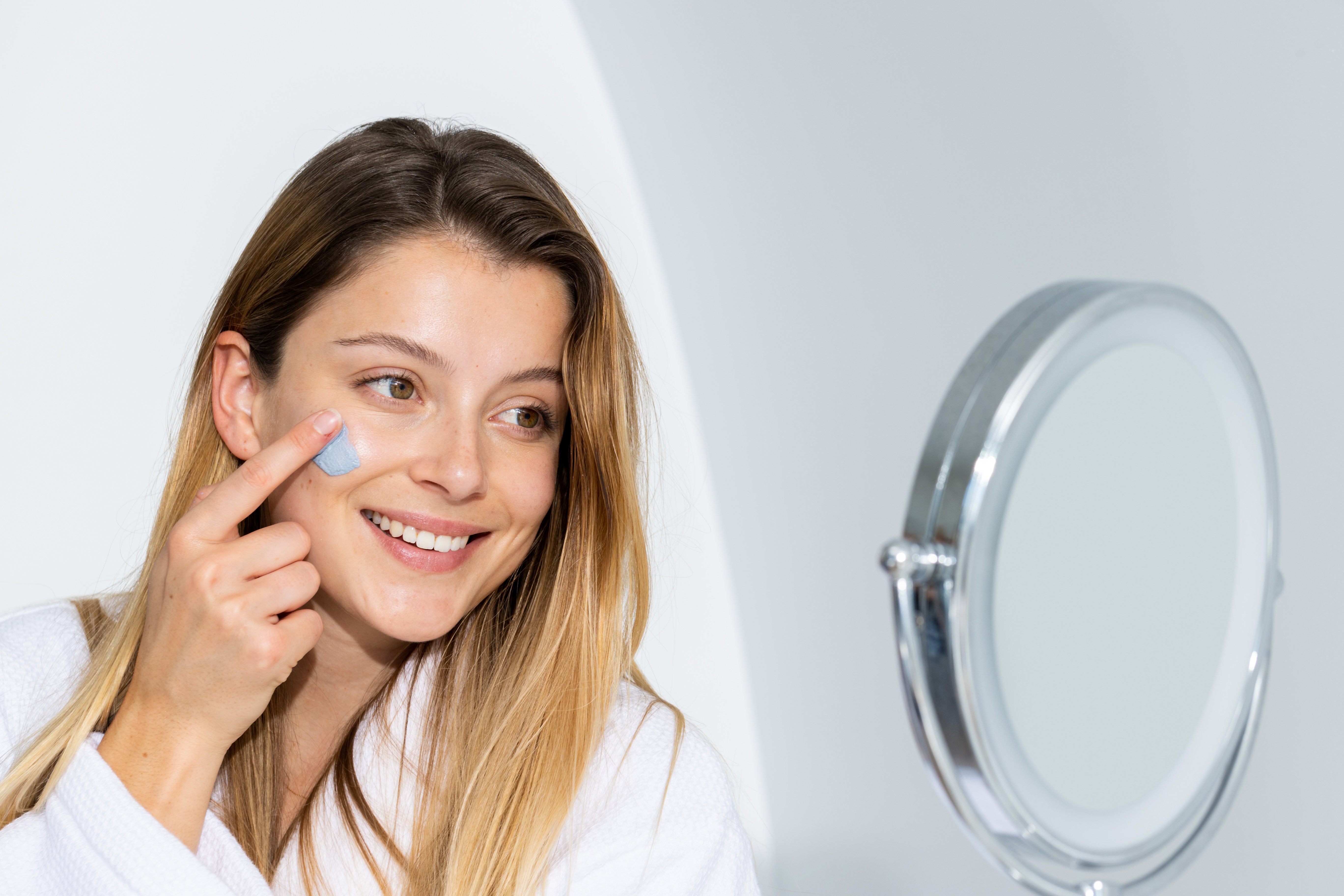acne
What Exactly Are Active Skincare Ingredients?
11.06.2021

At The Clinic, we only work with 'cosmeceutical' products; these are cosmetic products that contain active ingredients in higher concentrations. When applied topically to the skin, active ingredients penetrate more deeply and are clinically proven to produce better results that over the counter & cosmetics.
What are the active ingredients commonly found in cosmeceuticals?
Antioxidants (All Skin Concerns)
Antioxidants are naturally occurring vitamins and minerals that neutralise free radicals and protect the skin from environmental damage. Some popular antioxidants found in our skin products include: Green Tea, Chamomile, Willowherb, Spin Trap, Resveratrol, Tocopheryl Acetate (form of Vitamin E). Our favourite antioxidants are Vitamin C, Vitamin A and Niacinamide, we go into more detail about them below.
Most Antioxidants are safe to use during pregnancy and breastfeeding, however please refer to the individual product descriptions and always check with your physician.
View our range of Antioxidant products
Hyaluronic Acid (Dryness, Ageing)
Hyaluronic Acid can hold up to 1,000 times its weight in water! It re-hydrates the skin by increasing water content inside the skin cells, leaving the skin plump and firm and resulting in improvement in lines, wrinkles and skin laxity. Sodium Hyaluronate is the salt form of Hyaluronic Acid and a smaller molecule that more easily penetrates the layers of the skin.
Hyaluronic Acid is safe to use during pregnancy and breastfeeding, however please refer to the individual product descriptions and always check with your physician.
View our range of Hyaluronic Acid products

Lactic Acid (All Skin Concerns)
Lactic Acid is a type of alpha hydroxy acid (AHA) that can effectively and gently exfoliate the skin. Lactic Acid also increases ceramides which aid in skin hydration and promotes and increases collagen production.
Lactic Acid is suitable for all skin types and is safe to use during pregnancy and breastfeeding, however please refer to the individual product descriptions and always check with your physician.
View our range of Lactic Acid products.
Niacinamide (Oiliness, Acne, Pigmentation)
Niacinamide is a form of Vitamin B3 that helps to brighten the skin and improve pigmentation. Niacinamide also regulates oil production in the skin and assists in preventing breakouts in acne prone skin types.
Niacinamide is safe to use during pregnancy and breastfeeding, however please refer to the individual product descriptions and always check with your physician.
View our range of Niacinamide products
Peptides (Ageing)
Peptides are the building blocks of protein that reduce signs of ageing by signalling the skin to perform various cellular functions such as increasing production of Collagen and Hyaluronic Acid, reducing muscle contractions and increasing tissue repair and regeneration.
Most Peptides are safe to use during pregnancy and breastfeeding, however please refer to the individual product descriptions and always check with your physician.
View our range of Peptide products
Pigment Inhibitors (Pigmentation)
Pigment Inhibitors help to treat and prevent all forms of hyperpigmentation. Pigment Inhibitors reduce and regulate the production of melanin by inhibiting Tyrosinase - an enzyme responsible for melanin production. We love Pigment Inhibitors all year round in Australia, but particularly in the Summer when sun exposure increases.
Most Pigment Inhibitors are safe to use during pregnancy and breastfeeding, however please refer to the individual product descriptions and always check with your physician.
View our range of Pigment Inhibitor products
Salicylic Acid (Oiliness, Acne)
Salicylic Acid is a beta hydroxy acid (BHA) that is particularly effective at treating and preventing all forms of acne including blackheads, whiteheads and inflammatory acne, due to its antibacterial, anti-inflammatory and drying properties. Salicylic Acid is also oil-soluble and therefore an extremely effective exfoliant for oily and resilient skin types.
Products containing Salicylic Acid are not suitable for use during pregnancy or breastfeeding.
View our range of Salicylic Acid Products
Retinol (Acne, Pigmentation, Ageing)
Considered a powerhouse in the cosmeceutical world, Retinol is a derivative of Vitamin A that effectively treats multiple skin concerns including acne, hyperpigmentation and sun damage, also helping to decrease signs of ageing. Benefits of Retinol include increasing cellular turnover in the skin, thickening and increasing the density of the dermis (structural layer of the skin), regulating oil production, and increasing collagen production. Retinol also treats hyperpigmentation by removing existing pigmentation and regulating melanin production.
Retinol is a complex ingredient that can be irritating to the skin. Itl should be introduced slowly, for night time use only and always accompanied by adequate SPF during the day. Products containing Retinol are generally not suitable for use during pregnancy or breastfeeding.
Four forms of Retinol in order of potency:
- Retinyl Palmitate - weakest, least drying and the only form safe for pregnancy and breastfeeding.
- Retinol - most common form found in cosmetic products.
- Retinaldehyde/Retinal - strongest form found in cosmetic products.
- Retinoic Acid - purest form, also the most irritating, prescription only.
The type of Retinol is difficult to pin point on ingredients lists because not only does it come in four different forms, it is often combined with other chemical compounds to assist the delivery and absorption. For example:
LG Retinex in Cosmedix Serum 16 $139 - a microencapsulated Retinol for drier, sensitive skin.
Microencapsulated AGP Complex in Cosmedix Define $125 - all the benefits of Retinol with Antioxidants in a hydrating, cream base
View our full range of Retinol products
Vitamin C (Redness, Pigmentation, Ageing)
Vitamin C has multiple benefits in skin care, including powerful antioxidant properties that protect from environmental damage, particularly photo-damage. Vitamin C has anti-inflammatory capabilities that reduce redness and calm the skin. Vitamin C also increases and supports collagen production. Furthermore, it also helps to brighten and reduce hyperpigmentation.
Vitamin C comes in many different forms, relating to its chemical composition:
Tetrahexyldecyl Ascorbate - oil soluble, pH neutral, a more stable form of Vitamin C e.g. in Aspect Dr Active C Serum $135.
Ascorbic Acid - the most active form e.g. in Cosmedix Pure C Mixing Crystals $85.
Vitamin C is safe to use during pregnancy and breastfeeding, however please refer to the individual product descriptions and always check with your physician.
View our range of Vitamin C products
How to tell the difference between skin products with and without active ingredients?
The first thing to recognise is that price does not mean quality! Often you are paying for what’s on the outside of the tube or jar rather than what’s on the inside. The ingredients list on the back of products holds the key. Whilst this can be overwhelming with many words you may not know, the key things to look for are:
The active ingredients, any ingredients you may be allergic to and the concentration of ingredients. Below we've decoded the ingredients list of our four top selling products to help you understand what you're really putting on your face.
TIP 1: Look at the order in which the ingredients are listed. Whilst you will not see quantified concentrations, by law, the list must be in order of concentration. If the active ingredients are towards the front of the list, that indicates a more powerful product, if the active ingredients are towards the bottom of the list, that can indicate a weaker formulation.
TIP 2: Shorter ingredients list generally mean ‘cleaner’ products, or more simple formulations. Similarly, longer ingredients lists could mean more powerful products (as long as the ingredients in them are active and useful!)
TIP 3: Watch out for numbers on ingredients list. Just like food, these signal artificial preservatives that are chemically added to the product. A simple google search will help you identify what is or isn't a harmful chemical.
TIP 4: Do not be surprised that most skin products first, or main, ingredient is Water/Aqua/H20, this is common.
TIP 5: Do not be alarmed that Cleansers contain different Sodium-type ingredients. These create the lather, foam and viscosity of the liquid, affecting how it feels on the skin. However you do want to avoid Sodium Lauryl Sulfate specifically which is a detergent and known skin irritant.
If you have any questions, or would like expert advice about products, book a skin consultation with our registered nurses.

